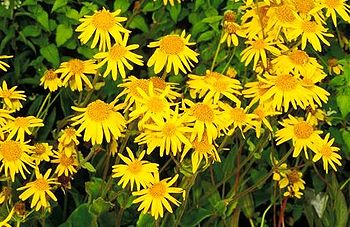Arnica
See also : Arnica Montana (Homeopathy)
Other Names: Arnica cordifolia, Arnica des Montagnes, Arnica Flos, Arnica Flower, Arnica fulgens, Arnica latifolia, Arnica montana, Arnica sororia, Arnikabluten, Bergwohlverieih, Doronic d’Allemagne, Fleurs d'Arnica, Herbe aux Chutes, Herbe aux Prêcheurs, Kraftwurz, Leopard's Bane, Mountain Tobacco, Plantin des Alpes, Quinquina des Pauvres, Souci des Alpes, Tabac des Savoyards, Tabac des Vosges, Wolf's Bane, Wundkraut. Arnica is a plant genus of about 30 perennials belonging to the Asteraceae, commonly referred to as the aster, daisy, or sunflower family.One of its species, Arnica montana, has been used as a natural healing herb for centuries. Montana refers to this daisy-like species growing habitat in the mountainous regions of the northern hemisphere, primarily Europe.
Special Precautions of Arnica
- Amounts that are larger than the amount found in food are LIKELY UNSAFE when taken by mouth. In fact, arnica is considered poisonous and has caused death. When taken by mouth it can also cause irritation of the mouth and throat, stomach pain, vomiting, diarrhea, skin rashes, shortness of breath, a fast heartbeat, an increase in blood pressure, heart damage, and coma.
- Arnica is generally safe when used on skin, although it should not be used near the eyes, on wounds, or broken skin. Some are sensitive to arnica and should stop using it if a rash or other allergic symptoms occur. Do not use on open wounds
- Long term use may cause eczema, peeling, blisters, or other skin conditions.
- Only homeopathic arnica should be taken by mouth unless under a doctor’s supervision. Homeopathic doses are so diluted that there is almost no detectable amount of arnica in them. They are considered safe for internal use when taken according to label directions.
- Forms other than homeopathic are rarely used as arnica taken internally can cause dizziness, tremors, skin conditions, vomiting, and irritate mucous membranes. Large doses can even be fatal, report experts at the University of Maryland.
- Don’t take arnica by mouth or apply to the skin if you are pregnant or breast-feeding. It is considered LIKELY UNSAFE.
- Allergy to ragweed and related plants: Arnica may cause an allergic reaction in people who are sensitive to the Asteraceae/Compositae family. Members of this family include ragweed, chrysanthemums, marigolds, daisies, and many others. If you have allergies, be sure to check with your healthcare provider before applying it to your skin. Do not take arnica by mouth.
- Digestion problems: Arnica can irritate the digestive system. Don’t take it if you have irritable bowel syndrome (IBS), ulcers, Crohn's disease, or other stomach or intestinal conditions.
- Surgery: Arnica might cause extra bleeding during and after surgery. Stop using it at least 2 weeks before a scheduled surgery.
- Medications that slow blood clotting (Anticoagulant / Antiplatelet drugs) interacts with arnica.
The Health benefits and uses of Arnica are
Arnica has been used to help the healing of many conditions:
- Bruises
- Sprains
- Pain
- Pain and Swelling
- Arthritis
- Infection
- Inflammation
- Varicose Veins
- Phlebitis (Vein Inflammation)
- Insect Bites
What Do Studies Say About Arnica Benefits?
- Antimicrobial that Fights Infection and Inflammation : A study reported in Plant Cell Reports found that Arnica montana roots contain five known thymol derivatives.Thymol has been proven to have a range of antimicrobial effects inducing antibiotic susceptibility in drug-resistant pathogens (germs) to powerful antioxidant properties.
- Pain Killer That Works As Well As Ibuprofen : A study of 204 patients with finger osteoarthritis compared the use of ibuprofen and arnica gel for effectiveness in pain relief and hand function. It found that arnica worked as well as ibuprofen and with less side effects.
- Arthritis (Osteoarthritis) : A Swiss study investigated the safety and effectiveness of Arnica montana gel in treating 79 patients with osteoarthritis (OA) of the knee. Study authors reported:
Sixty-nine patients (87%) rated the tolerability of the gel as "good" or "fairly good," and 76% would use it again. Topical application of Arnica montana gel for 6 weeks was a safe, well-tolerated, and effective treatment of mild to moderate OA of the knee.
